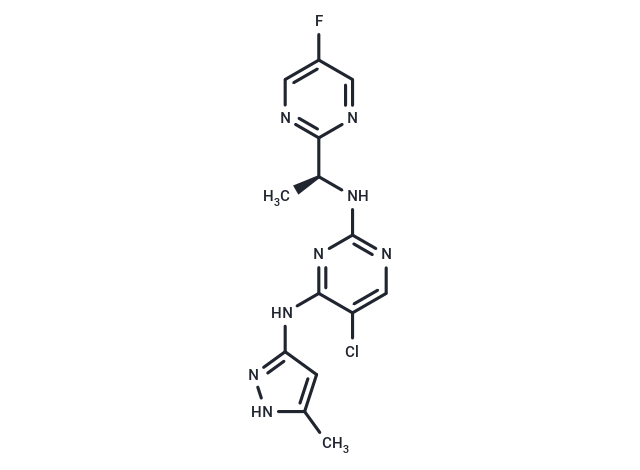Shopping Cart
Remove All Your shopping cart is currently empty
Your shopping cart is currently empty
AZD1480 is a novel ATP-competitive JAK2 inhibitor (IC50: 0.26 nM), selectivity act against Tyk2 and JAK3, and to a smaller extent against JAK1. AZD1480 has been used in trials studying the treatment of Solid Malignancies, Post-Polycythaemia Vera, Primary Myelofibrosis (PMF), and Essential Thrombocythaemia Myelofibrosis.

| Pack Size | Price | USA Warehouse | Global Warehouse | Quantity |
|---|---|---|---|---|
| 5 mg | $52 | In Stock | In Stock | |
| 10 mg | $81 | In Stock | In Stock | |
| 25 mg | $143 | In Stock | In Stock | |
| 50 mg | Preferential | In Stock | In Stock | |
| 1 mL x 10 mM (in DMSO) | $54 | In Stock | In Stock |
| Description | AZD1480 is a novel ATP-competitive JAK2 inhibitor (IC50: 0.26 nM), selectivity act against Tyk2 and JAK3, and to a smaller extent against JAK1. AZD1480 has been used in trials studying the treatment of Solid Malignancies, Post-Polycythaemia Vera, Primary Myelofibrosis (PMF), and Essential Thrombocythaemia Myelofibrosis. |
| Targets&IC50 | JAK2:0.26 nM, JAK1:1.3 nM |
| In vitro | AZD1480 inhibits the growth of subcutaneous xenograft tumors and extends the lifespan of mice carrying intracranial malignant gliomas by inhibiting the activity of STAT3, indicating that AZD1480's inhibition of the JAK/STAT3 pathway can be utilized in research targeting the treatment of patients with intracranial malignant gliomas. Furthermore, AZD1480 suppresses STAT3 phosphorylation in human solid tumor and multiple myeloma models, reduces angiogenesis and metabolism in human xenograft models, and demonstrates inhibitory effects on the growth of human solid tumors with active STAT. Additionally, AZD1480 inhibits lung metastasis and pulmonary infiltration of tumors in bone marrow cells. |
| In vivo | AZD1480, by affecting the microenvironment of tumors, can inhibit local metastasis and angiogenesis. As an effective inhibitor of JAK2, it suppresses the growth and survival of human multiple myeloma cells, as well as inhibits FGFR3 and STAT3 signaling and downstream targets, including Cyclin D2. At low micromolar concentrations, AZD1480 induces apoptosis and inhibits cell proliferation in myeloma cell lines. Moreover, at 5 μM, it induces cell cycle arrest at the G2/M phase and cell death through inhibition of Aurora kinases. In both human and murine glioma cells, AZD1480 effectively inhibits constitutive and inducible phosphorylation of JAK1/2 and STAT-3, thereby reducing cell proliferation and inducing apoptosis. |
| Kinase Assay | kinase assays: Inhibition studies of AZD1480 are performed using recombinant Jak1, Jak2, or Jak3 under buffer conditions of 50 mM HEPES pH 7.3, 1 mM DTT, 0.01% Tween-20, 50 mM/ml BSA, and 10 mM MgCl2. Jak3 enzyme is expressed as N-terminal GST fusion in insect cells and purified by glutathione-affinity and size-exclusion chromatographies. Enzymes are assayed in the presence of AZD1480 (10 point dose response, in triplicate, from 8.3 μM to 0.3 nM in half-log dilution steps) using 1.5 μM peptide substrate (Jak1: FITC-C6-KKHTDDGYMPMSPGVA-NH2, Jak2 and Jak3: FAM-SRCtide) and screened under their respective ATP Km (Jak1: 55 μM, Jak2: 15 μM, Jak3: 3 μM) and approximated physiological ATP concentration of 5 mM. Phosphorylated and unphosphorylated peptides are separated and quantified by a Caliper LC3000 system for calculating percent inhibition. |
| Cell Research | Renca or 786-O cells are suspended in DMEM medium with 5% FBS , and seeded in 96-well plates (5×103 per well) to allow adhesion and then treated with DMSO or AZD1480 for 48 hours. Cell viability is determined by MTS assay. Absorbance at 490 nm is measured with Mikrotek Laborsysteme. Mouse endothelial cells and splenic CD11b+/c- myeloid cells are enriched from tumor-bearing mice,and cultured in 5% FBS RPMI-1640 medium. HUVECs are cultured on collagen 1–coated plates in complete medium. All cells are treated with DMSO and AZD1480 at various doses for 24 hours. Cell viability is determined by counting cell number manually. All the experiments are repeated 3 times. (Only for Reference) |
| Molecular Weight | 348.77 |
| Formula | C14H14ClFN8 |
| Cas No. | 935666-88-9 |
| Smiles | C[C@H](Nc1ncc(Cl)c(Nc2cc(C)[nH]n2)n1)c1ncc(F)cn1 |
| Relative Density. | 1.517 g/cm3 |
| Storage | In solvent: -80°C for 1 year | Shipping with blue ice/Shipping at ambient temperature. | |||||||||||||||||||||||||||||||||||
| Solubility Information | Ethanol: < 1 mg/mL (insoluble or slightly soluble) H2O: < 1 mg/mL (insoluble or slightly soluble) DMSO: 40 mg/mL (114.69 mM), Sonication is recommended. | |||||||||||||||||||||||||||||||||||
| In Vivo Formulation | 10% DMSO+40% PEG300+5% Tween 80+45% Saline: 2 mg/mL (5.73 mM), Sonication is recommended. Please add the solvents sequentially, clarifying the solution as much as possible before adding the next one. Dissolve by heating and/or sonication if necessary. Working solution is recommended to be prepared and used immediately. The formulation provided above is for reference purposes only. In vivo formulations may vary and should be modified based on specific experimental conditions. | |||||||||||||||||||||||||||||||||||
Solution Preparation Table | ||||||||||||||||||||||||||||||||||||
DMSO
| ||||||||||||||||||||||||||||||||||||
| Size | Quantity | Unit Price | Amount | Operation |
|---|

Copyright © 2015-2026 TargetMol Chemicals Inc. All Rights Reserved.